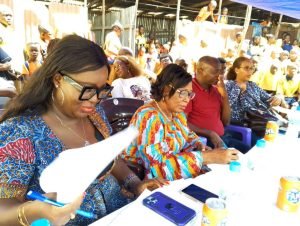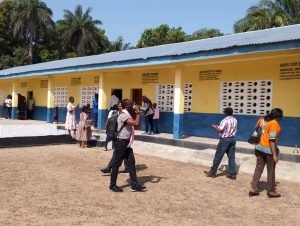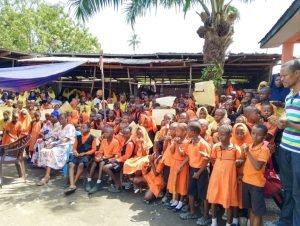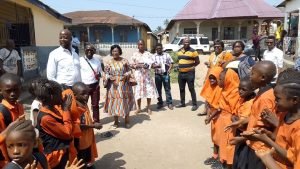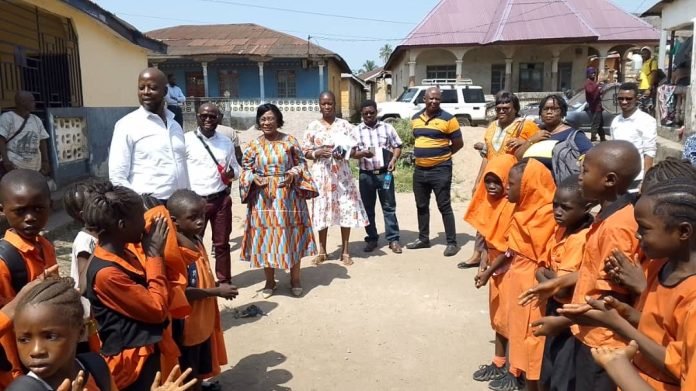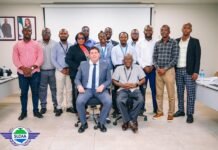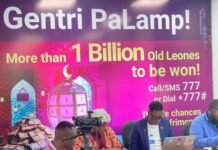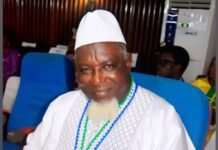By Foday Moriba Conteh
The Ministry of Basic and Senior Secondary Education (MBSSE) led by the Deputy Minister 1 of Basic and Senior Secondary Education (MBSSE), Emily Kadiatu Gogra has on Tuesday 26th November, 2024 concluded a two-day World Bank Mission Assessment visit in Schools in Makeni in order to assess the impact of ongoing projects in these various schools under the Free Education Project and other programs.
The team comprises of various partners, including the World Bank, FCDO, EU, EAA and Local Governments, working together with the MBSSE and the Teaching Service Commission.
In her remarks, the Deputy Minister emphasized that the mission aims to evaluate school infrastructure, training initiatives and mechanisms addressing School-Related Gender-Based Violence (SRGBV) under the Free Education Project and other programs.
Deputy Minister, Emily Kadiatu Gogra highlighted key investments, including the construction and rehabilitation of schools, training programs for teachers and the implementation of a grievance mechanism to combat SRGBV. These efforts, she noted, are part of a broader vision to ensure sustainable development in the education sector. “We are here to assess the successes and identify what still needs to be done. Holistically, a very good mark has been made and there is progress. The goal is to build on these efforts for sustainable development that benefits all,” she said.
The mission also covers other regions, including Kenema, which encompasses the south and east of Sierra Leone, while Makeni represents the northern region.
The Deputy Minister underscored the collaborative efforts of various partners, including the World Bank, FCDO, EU, and Local Governments, working together with the MBSSE and the Teaching Service Commission.
“We are all combined to ensure progress. Local Governments play a vital role as they oversee schools within their jurisdictions. Together, we aim to achieve impactful results,” she explained.
The visit aims to deliver positive outcomes by showcasing successes and outlining strategies for areas requiring improvement. Deputy Minister Emily Kadiatu Gogra stated, “We are expecting a lot of good news that highlights the achievements, how they were accomplished and the way forward for unmet goals.”
She also pointed to the broader impact of these projects, particularly on students and their learning outcomes. “Our focus is on the children themselves and the learning outcomes achieved in classrooms. These initiatives are transforming education and providing a better future for our pupils,” she concluded.
The Deputy Minister concluded by stating that the assessment visit is part of a comprehensive review of education initiatives, is expected to inform future strategies and ensure the sustainability of the gains made in Sierra Leone’s education sector.
During the school visit, Julius Fornah, a local educationist in Makeni, expressed gratitude to the Government of Sierra Leone and its partners for implementing the Free Education Project.
He highlighted the significant impact the initiative has had on the education sector, noting improvements in his community school.
According to Julius Fornah, the school previously faced challenges related to hygiene and access to water. However, the project has addressed those issues by providing a reliable water supply and improved toilet facilities.
He emphasized that these developments have enhanced the overall educational environment and contributed to better learning outcomes for students.
Dr. Dennis Luseni, Component 2 Coordinator of the Free Education Project Secretariat, noted that the team visited various schools, representing a diverse range of Government, Local Council and religious-based institutions. Each school demonstrated tangible improvements, including infrastructure renovations, provision of teaching and learning materials and the implementation of performance-based financing initiatives.
One school received renovation grant that facilitated critical upgrades such as replacing leaking roofs, constructing proper toilet facilities and deepening water wells for improved access. These improvements, Dr. Dennis Luseni emphasized, directly address challenges that previously hindered pupils’ comfort and ability to focus on learning.
Another beneficiary, the Islamic Primary School in Makeni, showcased similar enhancements, including new classrooms, upgraded sanitation facilities and the distribution of teaching aids. Dr.Dennis Luseni highlighted the link between these interventions and increased pupil and teacher attendance, further supporting improved educational outcomes.
The visit also provided an opportunity for community engagement. Stakeholders, including school management committees, parents and teachers, shared their stories and expressed appreciation for the government’s efforts and donor support. According to Dr. Dennis Luseni , these interactions provided valuable insights into the successes and challenges of the initiatives, paving the way for future interventions.
The donors’ presence, Dr. Dennis Luseni added, is vital as they assess the effectiveness of their investments firsthand. Positive feedback and lessons learned from these visits are expected to be documented in an aide-mémoire, which will outline achievements and propose solutions for ongoing challenges.
Dr. Dennis Luseni reiterated that the Free Education Project, supported by international donors, aims to create a conducive learning environment for students, improve teaching quality and ultimately enhance learning outcomes nationwide. The assessment underscores the importance of collaborative efforts in advancing Sierra Leone’s education sector toward sustainable development.
